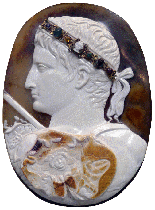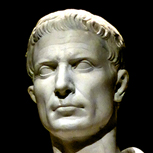The ROMAN CIVILIZATION
IMAGES OF THE ROMAN CIVILIZATION
Imperator Caesar not Caesar imperator
From this the title came to denote the supreme power
The On 16 January 27 BC the Senate gave Octavian the new titles of Augustus and Princeps. word princeps, meaning "first", was a republican term used to denote the leading citizen(s) of the state. It was a purely honorific title with no attached duties or powers. It was the title most preferred by Caesar Augustus as its use implies only primacy, as opposed to another of his titles, imperator, which implies dominance.
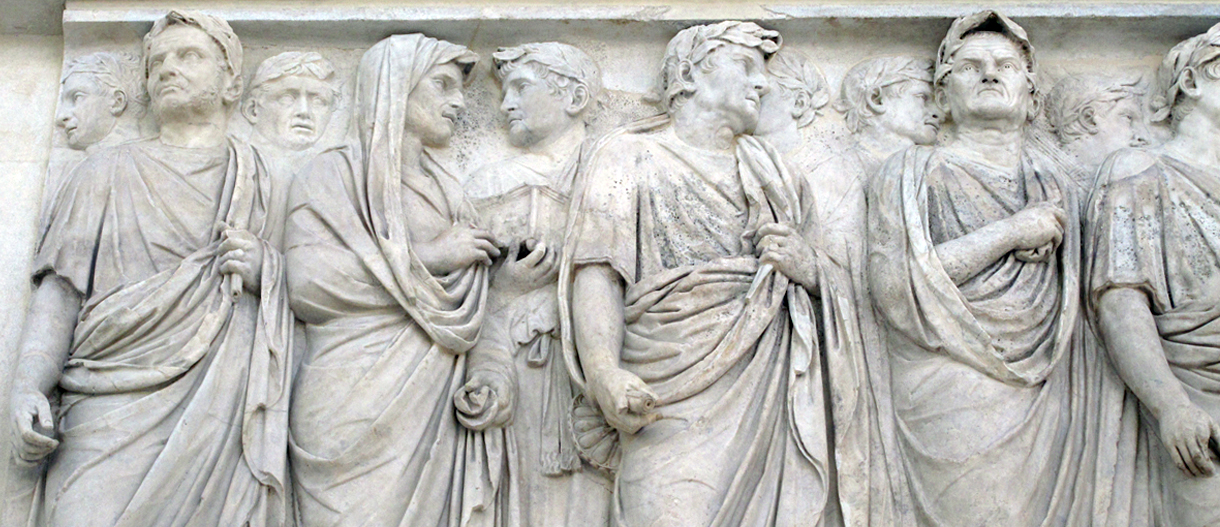
the END OF THE REPUBLIC
Octavian and Antony were left as the two most powerful men in the Roman world. Octavian took control of the west, including Hispania, Gaul, Italia, and Africa. Antony received control of the east, including Graecia, Asia, Syria and Aegyptus.
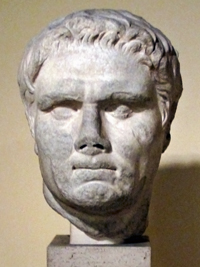
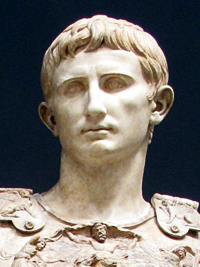
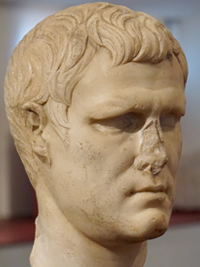
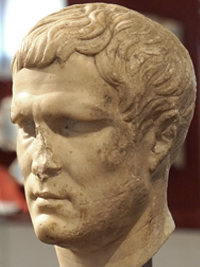
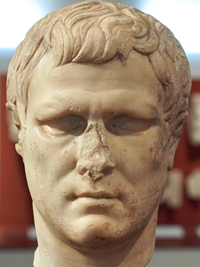
Marcus Vipsanius Agrippa
close friend who helped win the war
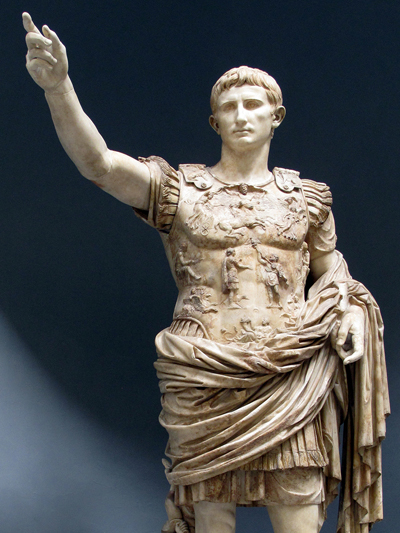
Gaius Julius Caesar Augustus
23 SEPTEMBER 63BC – 19 AUGUST 14 AD
Spouse: Livia (m. 37 BC–14 AD)
Siblings: Octavia the Younger
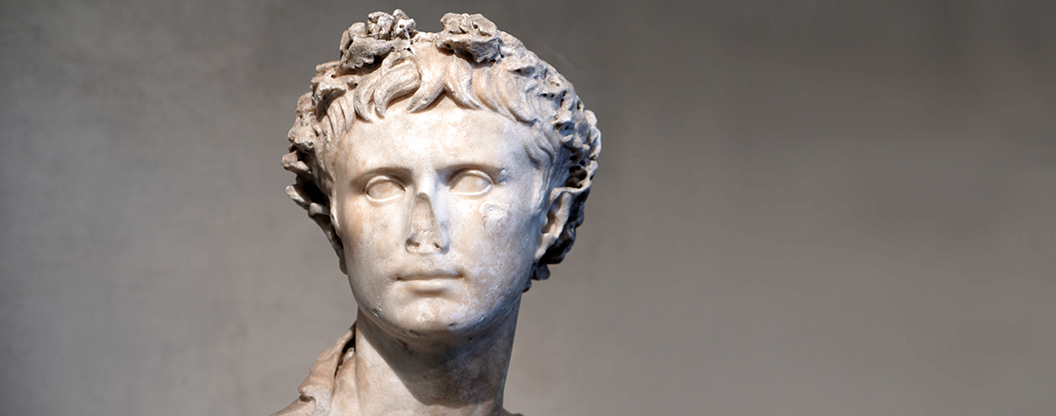 Augustus
Augustus
is arguably the single most important figure in Roman history.
In the course of his long and spectacular career, he put an end to the advancing decay of the Republic and established a new basis for Roman government that was to stand for three centuries. This system, termed the "Principate," was far from flawless, but it provided the Roman Empire with a series of rulers who presided over the longest period of unity, peace, and prosperity that Western Europe, the Middle East and the North African seaboard have known in their entire recorded history. Even if the rulers themselves on occasion left much to be desired, the scale of Augustus's achievement in establishing the system cannot be overstated. Aside from the immense importance of Augustus's reign from the broad historical perspective, he himself is an intriguing figure: at once tolerant and implacable, ruthless and forgiving, brazen and tactful. Clearly a man of many facets, he underwent three major political reinventions in his lifetime and negotiated the stormy and dangerous seas of the last phase of the Roman Revolution with skill and foresight. With Augustus established in power and with the Principate firmly rooted, the internal machinations of the imperial household provide a fascinating glimpse into the one issue that painted this otherwise gifted organizer and politician into a corner from which he could find no easy exit: the problem of the succession.
heir to caesar
Born into an old, wealthy equestrian branch of the plebeian Octavii family, in 44 BC Augustus was adopted posthumously by his maternal great-uncle Gaius Julius Caesar following Caesar's assassination. Together with Mark Antony and Marcus Lepidus, he formed the Second Triumvirate to defeat the assassins of Caesar. Following their victory at Phillipi, the Triumvirate divided the Roman Republic among themselves and ruled as military dictators.[note 3] The Triumvirate was eventually torn apart under the competing ambitions of its members: Lepidus was driven into exile and stripped of his position, and Antony committed suicide following his defeat at the Battle of Actium by Augustus in 31 BC.
Octavian becomes augustus
After the demise of the Second Triumvirate, Augustus restored the outward facade of the free Republic, with governmental power vested in the Roman Senate, the executive magistrates, and the legislative assemblies. In reality, however, he retained his autocratic power over the Republic as a military dictator. By law, Augustus held a collection of powers granted to him for life by the Senate, including supreme military command, and those of tribune and censor. It took several years for Augustus to develop the framework within which a formally republican state could be led under his sole rule. He rejected monarchical titles, and instead called himself Princeps Civitatis ("First Citizen"). The resulting constitutional framework became known as the Principate, the first phase of the Roman Empire.
pax romana
The reign of Augustus initiated an era of relative peace known as the Pax Romana (The Roman Peace). Despite continuous wars or imperial expansion on the Empire's frontiers and one year-long civil war over the imperial succession, the Mediterranean world remained at peace for more than two centuries. Augustus dramatically enlarged the Empire, annexing Egypt, Dalmatia, Pannonia, Noricum, and Raetia, expanded possessions in Africa, expanded into Germania, and completed the conquest of Hispania.
Beyond the frontiers, he secured the Empire with a buffer region of client states, and made peace with the Parthian Empire through diplomacy. He reformed the Roman system of taxation, developed networks of roads with an official courier system, established a standing army, established the Praetorian Guard, created official police and fire-fighting services for Rome, and rebuilt much of the city during his reign.
Augustus died in 14 AD at the age of 75. He was succeeded as Emperor by his adopted son also stepson and former son-in-law, Tiberius.

the END OF THE REPUBLIC
The final war of the Roman Republic, also known as Antony's civil war or the war between Antony and Octavian, was the last of the Roman civil wars of the republic, fought between Cleopatra (assisted by Mark Antony) and Octavian. After the Roman Senate declared war on the Egyptian queen Cleopatra, Antony, her lover and ally, betrayed the Roman government and joined the war on Cleopatra’s side. After the decisive victory for Octavian at the Battle of Actium, Cleopatra and Antony withdrew to Alexandria, where Octavian besieged the city until both Antony and Cleopatra committed suicide.

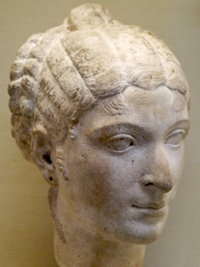
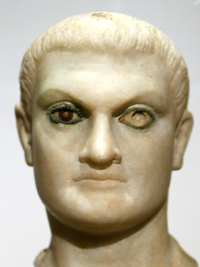
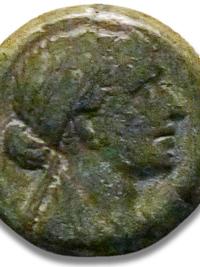
Augustus Time line
63 BC Born (as Gaius Octavius) to Gaius Octavius and Atia, niece of Julius Caesar.
45 BC Octavius accompanies Caesar to Spain for the Battle of Munda
44 BC Caesar is assassinated, his will stating that he has adopted Octavius.
43 BC Octavius takes the name Gaius Julius Caesar Octavianus.October,
43 BC Octavian, Antony and Lepidus form the second triumvirate. Proscriptions of at least 100 senators, including Cicero.January 1,
42 BC Caesar is deified and Octavian becomes Divi Filiu, the son of a god.October 23,
42 BC Battle of Philippi - Mark Antony and Octavian defeat the armies of Brutus and Cassius, Caesar's assassins.
39 BC Octavian marries Scribonia, with whom he has a daughter, Julia.
38 BC Octavian divorces Scribonia and marries Livia.
37 BC Antony marries Cleopatra.
36 BC Octavian and Lepidus defeat Sextus Pompey at Naulochus. Lepidus is removed from the Triumvirate, leaving Rome in the hands of Antony and Octavian.
32 BC Rome declares war on Egypt and assigns Octavian control.
31 BC Octavian and Agrippa defeat Antony at the Battle of Actium.January 16,
27 BC Octavian receives the title Augustus. Augustus receives proconsul power in Spain, Gaul, Syria and Egypt.
23 BC Augustus receives imperium maius and tribunicia potestas, giving him power over the magistrates and veto authority.
22 BC Augustus travels to the east, is initiated into the Mysteries of Eleusis, and recovers the standards captured from Crassus by the Parthians.
17 BC Augustus adopts Gaius and Lucius Caesar.
12 BC Augustus takes the role of Pontifex Maximus.
2 BC Augustus becomes pater patriae.
4 AD Augustus adopts Tiberius and Tiberius adopts Germanicus.
9 AD Battle of the Teutoburg Forest - Germans ambush and destroy Publius Quinctilius Varus and three legions.
14 AD Augustus dies at Nola.
